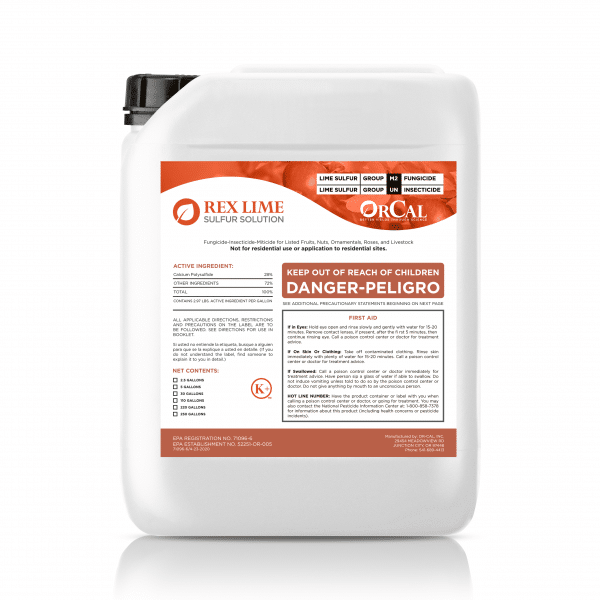Are you looking to diversify the IPM scheme for your fungicide/insecticide/miticide spray program? Lime sulfur has been used for over 150 years; once the standard by which all other fungicides were gauged, it still performs today as it always did; it’s physical mode of action to destroy pests keeps them from coming up with ways to build resistance.
Start off clean in the spring! REX LIME SULFUR SOLUTION is exceptional in cleaning up overwintering pests from the ground floor to the top of the crop.
In 1910 when it was first being introduced into America’s horticultural crops, research entomologist A.B. Cordley wrote in the Oregon State Extension Bulletin #108: “As a winter spray one application of lime-sulfur spray each year will do more for the neglected orchard than can be done in any other way by the same expenditure of cash or energy…The best winter spraying is immediately after the leaves drop in the fall—even before they are all off.”
Clean up sprays are very effective in controlling susceptible insects, their eggs, and newly deposited diseases, spores and fungal parts that overwinter on dead or dying leaves, twigs, canes, vines, and branches.
- REX LIME SULFUR SOLUTION contains 28% Calcium Polysulfide and is an economical, versatile and highly effective fungicide, insecticide and miticide listed on over 30 crops including fruits, nuts, ornamentals, roses, plus livestock; to control nearly 80 diseases and pests!
- REX LIME SULFUR SOLUTION has no known deleterious effects on honeybees.
- REX LIME SULFUR SOLUTION is one of the only dual action apple blossom thinning product that provides both thinning and fungicidal treatments. This product is OMRI listed and registered for use in organic production by WSDA Organic Program.
- REX LIME SULFUR SOLUTION has applications for winter, spring, summer and fall.
REX LIME SULFUR SOLUTION has continued to be found safe to human health and the environment, according to the United States Environmental Protection Agency’s 2005 Reregistration Eligibility Decision and 2019 Interim Registration Review Decision. “The Agency has determined that calcium polysulfide rapidly degrades to calcium hydroxide and sulfur in the environment and in the body.” Pg 1*. Calcium hydroxide has a Food and Drug Administration designation of Generally Recognized as Safe (GRAS) as a food additive (21 CFR 184.1205). Similarly, EPA has determined “[t]he human risks, if any, from both dietary and occupational exposures to sulfur are considered to be very low because of the general knowledge of the chemical sulfur, its ubiquitous occurrence, and its low toxicity, as well as its long history of use by humans, including some pharmaceutical applications.” Pg. 6** Lime sulfur rapidly changes into sulfur, calcium hydroxide (slaked lime) and gypsum. “In the soil system, the modest amounts of calcium and sulfur that result from the use of calcium polysulfide are not believed to be significant when compared to their respective natural background levels.” Pg. 8* As a Group M2 Fungicide and “Because of its multi-site activity and mode-of-action that is not conducive to development of pest resistance, fungicides from this group are particularly valuable to growers as broad-spectrum protectant materials. While instances of resistance have increased in numerous other chemical classes, group M2 fungicides provide reliable and inexpensive options for growers to manage fungal pests.” Pg. 9-10** Further, “Lime sulfur is not acutely toxic to adult honey bees on a contact exposure basis.” Pg. 8** EPA has stated, lime sulfur “…is an important and reliable disease management tool for organic growers.”pg. 10**.
Sources:
* Special Review and Reregistration Division. Office of Pesticide Programs. (September 30, 2005). Reregistration Eligibility Decision for Inorganic Polysulfides, List D, Case No. 4054. Environmental Protection Agency.
** Pesticide Re-evaluation Division. (June 26th, 2019). Proposed Interim Registration Review Decision, Case Number 4054. Inorganic Polysulfides (also known as Clacium Polysulfide or Lime Sulfur). Environmental Protection Agency.

